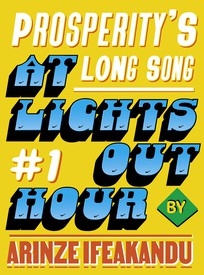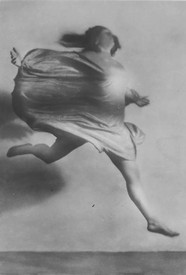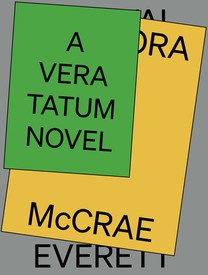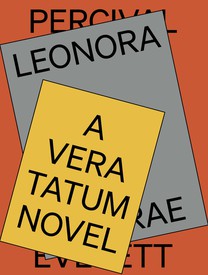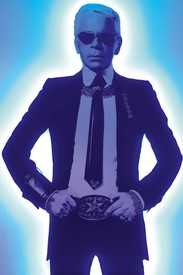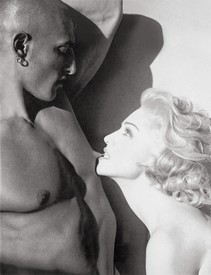
Percival Everett is the author of twenty-two novels and four collections of stories. His novels include The Trees (2021), Telephone (2020), So Much Blue (2017), and Erasure (2001). He has received awards from the Guggenheim Foundation and Creative Capital. He lives in Los Angeles, where he is distinguished professor of English at the University of Southern California.
36
The morning was extremely cold but Vera was in her house. That was all that mattered. She walked the dogs up the mountain. Mutt was favoring a foreleg. She would have to take him to the vet in town. Still, he bounded in and out of the brush happily. To her surprise, flakes of snow started to appear. The last thing she wanted to see was more snow.
When she returned to her house, she learned from the weather report that a heavy snow was coming that night. She decided to take her dog down to Taos before they were trapped up there for a few days. As she was preparing to leave, her phone rang. It was Sheriff Montoya.
“Vera.”
“Sheriff.”
“I’m driving up your way today. I have someone I’d like you to meet. Would you mind?”
“As a matter of fact, I’m heading down to Taos myself. I have to take my dog to the vet. I’ll meet you there. May I ask who you want me to meet?”
“His name is Askook Daisy.”
“That’s some name.”
“We can explain everything when we see you,” Montoya said.
“Okay, Robbie.” His first name felt odd in her mouth.
“Thanks, Vera.”
They made a plan to meet for lunch at Ernesto’s.
Vera fed the horses and came back to the side of the house to see that the garbage can had been destroyed. There had been nothing in it except the stink of waste, but it let her know that the bear was hungry. She was surprised she hadn’t heard the animal. She had always been a light sleeper, even lighter since her husband’s death, but lately when she slept, it was deep, dark. The dogs must have barked but she hadn’t heard them.
Again, the Bronco balked. She pushed the gas pedal to the floor and tried again and the car started. Her drive down to town was uneventful, though the snow was beginning to fall a bit harder. She would definitely be finding her way home before late.
The vet’s office was crowded but they took Mutt in quickly. It was decided that she would leave him while they took blood and X-rays. She left her car there and walked the four blocks to the plaza. She was early for lunch so she stepped into the Sunset Gallery. She paused at the little table at the door. There was a box of face tissues and a large pump bottle of hand sanitizer.
“Crazy, right?” a young woman said.
Vera disinfected her hands.
“It’s getting bad in some places. They’re talking about closing everything in New York and Seattle.”
“Scary,” Vera said.
“The masks don’t help, but they don’t really know. Surfaces, they say.”
Vera nodded and made her way through the gallery. She had never really liked the local art—bright landscapes all in the same broad-stroke style, coyotes and wild-maned horses. There was a painting by a guy named R. C. Gorman. When she was younger she had liked his work, but now that she was shaped more like the Navajo women he depicted, she liked it a bit less.
“Come back,” the young woman said as Vera left.
Vera nodded to her as she applied more sanitizer to her hands.
At Ernesto’s she found Sheriff Montoya already seated with an older man, a big man. Montoya was dressed in neat street clothes, not his sheriff’s uniform, and the other man wore a suit with no tie. He had the smooth face of so many Native men. They stood as Vera approached them.
Montoya shook her hand with both of his hands. “Vera. Thanks for coming down. This is Askook Daisy.”
“At your service, madam,” the man said. His voice was deep, a kind of rumble, but clear.
“Mr. Daisy.” His name didn’t sound like a real name. It made her want to laugh. The man seemed so familiar.
“Mr. Daisy, have we met before?”
“I would remember that,” Daisy said.
They sat. Vera looked around at the sparse crowd.
“Vera, Askook is from Shiprock. He’s a scholar of sorts.”
“Of sorts,” Daisy repeated.
“What kind of scholar?” Vera asked.
“I’m a member of the Diné. You might say I’m a detective.”
Vera nodded.
“I’m not a medicine man, but I study our ways very intensely.”
“Okay.”
Montoya leaned in. “Vera, we found more parts of people. Not just torn apart, but partially devoured, we think.”
A chill ran through Vera.
“There might be an Andy or an Opie, but there is no Andy and an Opie. Like I told you before, as far as we can tell, there is no one named Andy or Andrew or Anders Kedi. Anywhere.”
Vera listened.
“You didn’t see a man on that bus, did you?” Montoya asked. “I mean, you didn’t get a clear look at him, but you don’t think it was a man?”
Vera shook her head. “Sort of a man.”
“A man can’t tear through a bus,” Montoya said. “Did he have a tool, an axe or something?”
“I didn’t see one.”
“There were no tool marks on the bus roof,” the sheriff said. He shifted a bit in his seat. “An examination of the bus showed no signs of foreign metallurgic evidence. Only skin, fur, and blood.”
Vera looked at him.
“Analysis of the blood and fur suggest feline.”
“Yee Naaldlooshii,” Daisy said. “Skin-walkers.”
“Just listen,” Montoya said.
“In my world we have what we call skin-walkers. They are evil people who have succumbed to dark forces. They can shape-shift. That means they can assume other shapes, forms.”
“What does that mean, other forms?” Vera asked.
The waitress came, hovered there, waited. She coughed to interrupt them. They ordered quickly and she left.
Daisy watched the server leave. He looked at Vera’s eyes. “They can become other things. Wolves. Lions. Some believe they do this by wearing pelts of those animals. Some believe they can just do it.”
Vera looked at Montoya. “You don’t believe this, do you?”
“I wouldn’t have before. I also don’t believe what I’ve seen this past week.”
“So you think what I saw was a Navajo guy who can turn into a cougar.”
“Do you know what it was?” Montoya asked.
“And you think Andy is a walker thing.”
“A skin-walker,” Daisy said.
“But he’s white,” Vera said.
“A skin-walker can turn into a lion or a bear, a raven,” Daisy said. “You don’t think he can just turn into a white guy? And you should know, there are shape-shifters who aren’t evil.”
“This is crazy,” she said. “You’re saying some Navajo guy did this.”
“I didn’t say he was Diné.”
“Crazy,” Vera said.
“Absolutely,” Montoya said.
“Why are you telling me all this?”
Daisy cleared his throat. “Apparently you made a connection with the demon. He was alone with you and he didn’t kill you. There’s got to be a reason.”
“I don’t like this,” Vera said.
“And you shouldn’t,” Daisy said. “Skin-walkers don’t leave loose ends. They kill everything in their path and their paths are extensive. They thrive on fear. They feed on fear. They need fear to live. The intensity of it. Can I hazard a guess? You’re a person who doesn’t scare easily.”
“Robbie,” she complained.
“That’s enough, Askook.”
“Why are you doing this?” she asked. “You don’t believe any of this.”
“I don’t know, Vera, but I thought you ought to know.”
“Well, I don’t believe a word of it.”
“I understand,” Montoya said. “I don’t think I do either, but there’s so much I can’t make right in my mind.”
Vera drank some water. She looked at the snow falling on the plaza.
“How would it even know where I live?” Vera asked.
Daisy shrugged. “Maybe he doesn’t. But they can run a hundred miles in a night. They have exaggerated senses.”
Vera looked at them. “What am I supposed to do?”
“I’m sorry to scare you, Vera.”
“I’m sorry you’ve scared me too,” she said.
“This is real,” Daisy said.
“What should I do, Mr. Daisy?” she asked.
“If I can find out his name, all you need to do is say it aloud to him.”
“Okay, this is a big joke. Very funny.”
Montoya raised a palm to stop Daisy. “There is probably nothing to any of this, Vera. Did Andy or Opie say anything else to you that you remember as odd? The name of a place, maybe?”
“No.”
The food came, but Vera couldn’t eat. She couldn’t really look at it. She looked at Daisy’s face again. He was so familiar. “Gentlemen, I’m going to pick up my dog and go home.”
“I’m sorry, Vera,” Montoya said.
“I’m trying to find his name,” Daisy said.
“Bye.”
Vera left the restaurant and felt unsteady. She closed her eyes for a second and felt the cold wet snow on her face. She was terrified, but also certain that everything she had been told was bullshit. Daisy was a nut. And now she thought Montoya was, too. But she hadn’t thought that about him before. In fact, she trusted him. She walked back through the snow to the vet’s office.
37
The X-rays of Mutt’s leg showed nothing. The vet suspected a pulled muscle, but said that it was probably age. Wasn’t everything age?, Vera thought. Mutt was exhausted from the examination and lay quietly in the back seat. Vera drove cautiously, fearing ice, skidding, and death. She replayed that strange conversation over and over, by far the most bizarre exchange she had ever had or heard. She couldn’t believe that Robbie Montoya actually believed any of that nonsense. But what was he to do, not tell her any of it? She was caught appreciating the transparency and hating having been made to feel afraid by utter superstition. The snow was falling hard and blowing everywhere.
As she drove up the mountain, the trees seemed to crowd her. The snow was near blizzard now. Miguel would have to take out the Cat and plow the road. She thought she saw shadows in the forest through the snow. She was spooked and she didn’t how to shake the feeling.
She parked inside the big barn. The walk to the house from there was about fifty yards. She thought of the bear and wondered why he wasn’t napping somewhere in a nice warm cave, but sometimes bears didn’t hibernate, they just slowed down. The vet had told her this and she believed him. Anyway, there was a bear and she didn’t want to see him. She kept an air horn just inside the door and the shotgun was loaded. It was always loaded but it was never cleaned, so it was anyone’s guess whether it would fire.
Vera wasn’t certain that Miguel had been up there. With the snow, he might well have been checking on his mother. She went out into what was now a blizzard to bring the horses into the barn. Mutt was sacked out but she brought the smaller dog, Mongrel, with her—an undersized German shepherd mix, but far fiercer and more protective than the larger Mutt.
Of course the horses had parked themselves way out in the middle of the pasture. Vera banged on the grain bucket but they did not come running up as usual. It was at times like this that she wished she had trained her dogs to go fetch the horses. She hadn’t because at one time she’d had a donkey out there who was as likely to turn and attack a dog as she was to be herded. Vera grabbed a halter from a hook by the paddock; where one went the others would go. She told Mongrel to stay and she walked out into the pasture. The ground was wet and muddy, sloppy, and she could see ice forming in spots. She imagined that the bubbler wasn’t working on the trough and since she didn’t want to freeze to death fixing it, it was best to move them inside. They looked up at her approach, but did not move. It was unlike them.
As she grew close she could see that the gelding’s left haunch was bloody. She spoke out to the animals and they finally turned their heads. The three of them snorted and stamped. Closer, Vera could see the gash high on the gelding’s rump. She looked around. Perhaps they had startled the bear at the water trough. A bear would never just up and attack a horse, she thought. The horse was suspicious as she reached for the wound, but didn’t run. She haltered him and walked him back to the barn. The other two dropped their heads and followed. The snow was stinging her eyes and falling harder than she had ever seen it. There was no sound but the breathing of the injured horse she led.
Back at the gate, Mongrel was gone. She called her but the dog must have run back to the house. It was cold out there and Mutt was inside. Vera put the horses in their stalls and gave them some grain and molasses. While the gelding ate she examined his haunch. It was a fairly deep wound, but it didn’t look like it needed sutures or staples. That was good. She resisted the urge to put antibiotic ointment there, remembering what her cowboy horse vet always told her: It’s a horse. Treat him like a horse. He told her not to do to an open wound what she wouldn’t do to her own eye. To Vera, that meant looking for something foreign, washing it out and leaving it alone. So she did.
She called out for Mongrel again and started back to the house. She screamed as a figure appeared at the barn door.
“Vera, it’s just me, Miguel.”
“God, you scared me nearly to death.”
“I’m sorry. I thought I should come up and check on you before the road is snow blocked.”
“Thank you.”
“I’ll leave my truck and take the Cat down. That way I can plow my way back up.” Miguel noticed the blood on Vera’s sweater. “Are you hurt?”
“It’s Rusty’s blood. I think the bear clawed him.”
Miguel looked across the aisle at the horse. “I’ll check him out. I’ll also put the blankets on them.”
“That would be good.” Vera was surprised she hadn’t thought to do that. Exhaustion, she figured. “Don’t spend too much time here.”
“I won’t,” Miguel said.
“Did you see Mongrel out there?”
“No.”
“Thank you again.” Vera walked away into the snow and toward the house. She called Mongrel as she walked. There was no sign of the dog. She stood at the door and worried. She called out again.
“What’s wrong?” Miguel called out to her from the Cat.
“I can’t find Mongrel!”
“You go inside! I’ll look for her!”
She was freezing so she did go inside. Mutt was still asleep on his bed.
The phone rang. She picked up.
“Vera, it’s Robbie.”
“Hi.”
“Sorry about today,” he said. She could hear him thinking. “It’s just that I’m really confused about things.”
“It’s okay,” she said. But she was a little distracted. She was looking out the big window at the yard, trying to spot Mongrel.
“Are you okay?” he asked.
“Sorry, looking for my dog. Listen, I understand that this is a tough case and all, but to bring that crazy guy. I don’t need that in my life.”
“He’s not crazy,” Montoya said.
“Whatever, he sounded crazy.”
“Be careful up there, okay?”
“Okay.” She hung up.
She walked into the kitchen to put on water for tea. She heard the big engine of the Cat start up. She remembered arguing with her husband about how expensive that thing was, but it had turned out to be absolutely necessary on the mountain. She had learned to drive it, but now the steering handles felt pretty tricky to her and with the plow down she had to admit that she couldn’t control it.
She poured her tea and sat at the kitchen table. It was still early but it was dark. She would have to make something for dinner but really didn’t want to. Since living alone for so long, she had found that eating was often an inconvenience, something that just had to be done. She found her diet repetitive and boring. She was coming to hate broccoli and asparagus. Tonight she’d just have yogurt and tea and call it good, hope that her stomach didn’t start growling in the middle of the night.
She went to the door again and called for Mongrel.
38
Vera tried to rationalize Mongrel’s disappearance. Maybe she had chased a rabbit or a shadow into the woods; she was a chaser. She had spent the night in the barn on many occasions so she knew how to get dry and warm. Vera hoped that Miguel would find her or that she would find Miguel.
She put a big log in the fireplace and decided she needed cozier clothes. She walked upstairs and into her room. She opened the top drawer of her dresser and there were the socks she’d bought in Santa Fe. The socks she couldn’t find at Kachina. She’d unpacked and had no recollection of taking the socks from her bag and putting them in the drawer. Perhaps they could have been folded into something, but here they were, on top. She stepped back and fell to sitting on her bed. Was she going crazy, becoming senile? Was that a senile thing to think?
She did not change into cozier clothes. She put on silk underwear, jeans, a heavy wool sweater, and her cold-weather boots. She was going out to look for Mongrel. The snow was blowing through the yard lights and the vapor lamp over the barn. She put on her husband’s old ski goggles, gloves, grabbed a flashlight, and took the shotgun from beside the door. She knew it was freezing out but she could hardly feel it. Perhaps it was fear, perhaps anger, that allowed her to ignore the temperature. She called out for her dog. The Cat was still idling beside the barn, the headlights shining behind the blowing snow. She called out for Miguel. The snow had hushed everything and she felt like her calls traveled a few yards and fell to the ground.
She decided to start at the pasture gate. That was where she had first missed the dog. With the fast-accumulating snow there were no prints to find. Her own tracks were filled in nearly as quickly as she made them. She looked at the lights in her house windows and then over at the barn. She walked, leaned into the wind. The rumbling of the Cat’s engine made her nervous. She was looking now not so much for Mongrel as for Miguel. She called the man’s name every few steps. She stopped at Miguel’s little truck and aimed her light inside.
She entered the barn and switched on the interior lights. The horses stirred. The gelding whinnied and stomped. She called for Miguel and the dog. Nothing. Her car was sitting in the middle of the aisle. She looked beneath it. She searched through all the stalls, occupied and not. The horses were all on the muscle. She made her way to the far end and called out again.
There was a sound outside. A tapping. A pipe on metal perhaps. It was rhythmic, but stopped after about half a minute. It could have been coming from anywhere. She went to the Cat and found the cab empty. She moved the light around and found nothing. There was an old empty beer can from when she’d hired a county worker to use her machine to grade her drive. She’d left it in there because she was amused by the beer’s brand name, Falstaff. There was nothing else to do but return to the house. She was feeling the cold more now and her knees began to complain.
The lights in the house went dark. So did the yard lights. So did the lights of the barn behind her. The house and the barn were on separate boards, so it was strange that both would go out. She struggled to breathe. If the power was out, so was her phone. She walked slowly through the snow. She switched off her flashlight: if there was a something out here why give away her location? She held the shotgun barrel up and ready.
She heard running, an animal running. She backed up a few steps. A light hit her eyes and she put her arm up to block it.
“Vera.” It was Miguel.
“Damnit, Miguel, I almost shot you.”
“I’m glad you didn’t,” he said.
Vera smiled for what seemed like the first time in weeks. She saw that the man had Mongrel attached to a lead rope.
“I found her. She was chasing something in the woods, I guess, and the rope got caught up in some brush.”
“You didn’t put the lead on her?” Vera asked.
“No. Didn’t you?”
“I must have,” she said. “I’ve been forgetting all sorts of stuff. Maybe I’m having a stroke.” She was half serious.
“Want me to take you down to the infirmary?”
“Let’s get in out of the cold.” She took the lead and handed Miguel the weapon. “Do you know why the lights went out?”
“No idea,” he said.
And then the lights came back on. House and barn.
“That’s weird,” Miguel said.
“Come in and have some coffee before you head down,” Vera said. Really, she didn’t want to be alone.
39
Sitting at the kitchen table, Vera could see that Miguel wanted to go down the mountain to check on his mother and that he was also concerned about her. She wished she hadn’t made the joke about a stroke.
“Vera, it would be no trouble for me to drive you down to the hospital,” he said. “We could use your car and then I’d bring you back up.”
“What about your mother?” she asked. Mongrel stayed close to Vera and she stroked the dog’s ears.
“I’ll check my mother out while they check you out,” he said.
She looked out the window. No, she was fixed on the possibility that she’d suffered some kind of event. She’d had no symptoms of stroke, no headache, no weakness, no loss of balance, but someone had put a leash on her dog and she didn’t remember doing it. However, in a blizzard it would have made sense to do it. Perhaps she had.
“Vera?”
“I’m sorry, I was thinking. I’m all right, Miguel. You’re kind to worry. Do you want to call your mother and tell her you’re on your way?”
“She can’t hear the phone,” he said. “I was going to get one of those phones that flash a light, but then she wouldn’t be able to hear me talking anyway.”
Vera nodded.
Miguel stood at the window and looked out at the weather. “It might be slowing down a little.”
Vera didn’t want him to leave but she knew he had to. “Let me make you a thermos of coffee. It takes a while to drive that Cat down.”
“Right now it’s faster than my little truck.”
“I guess that’s right.”
“I’ll bring some wood in for you before I leave,” Miguel said. “If the power is going to act funny, then you need to keep this place warm.”
“You’re right.”
Miguel shook his head. “Crazy dog. She was probably chasing that bear. You know, they say dogs are like their masters.”
“That’s what they say.”
Vera watched the rear lights of the Cat disappear down the drive. She grabbed the broom that always leaned by the front door and swept the walk. She’d found that if she did that periodically through a snowstorm, the walkway was less likely to become a treacherous sheet of ice.
She returned to the kitchen, washed the mugs, and put them on the rack. She stoked the fire. Stood there for a while and watched the flames embrace the new log. Mongrel was now curled up next to Mutt.
Vera sat on the sofa in front of the fire. Being near the dogs made her feel more relaxed. She recalled her father saying so very long ago that no one can sneak up on a person with a dog. She fell asleep.
She awoke, happy like her dogs. To see that it was daylight and not snowing filled her with relief and some degree of confidence. She looked out at the beautiful scene and then saw the Cat parked beside the barn. Miguel had come back early. He was a good person, she thought. Rare. His truck was still parked in the yard. The windshield and bed were covered in snow. So he was still around. There were no tracks between the barn and the pasture, so she was certain he hadn’t moved the horses.
She went upstairs, brushed her teeth. She didn’t bother changing her clothes. She walked down to the mudroom and slid into her Wellingtons. She had not been able to get up and sweep through the night so the walkway was indeed icy. She was afraid of falling, but didn’t. The dogs bounded out with her, jumping through the powder and chasing each other like pups.
Vera could hear that the horses were nervous as she approached the barn. She would feed them where they were and let them relax before moving them to the pasture. Perhaps Miguel had already given them some grain and molasses.
“Miguel!” she called out.
There was no sign of the man.
She looked up and down the aisle. The horses were looking at her. They had not been fed. She went to the big can where she kept the grain and found it empty. The can had been half full. She was confused. She didn’t believe a bear would eat grain. Maybe it would, but even if one did, she highly doubted it would replace the lid of the can when done. She looked back and saw that the dogs had stopped just outside. They stood there, refusing to enter the barn.
“Miguel!”
She walked out of the barn and to the Cat. She could see through the glass that the cab was empty. There were no tracks but hers anywhere she could see. She went back into the barn to check out the gelding’s wound. The bleeding had stopped and she even thought she could see the beginning of some granulation. That made her feel good.
“Miguel!”
Where was he?
40
Vera trotted back to the house. The dogs thought she was playing and got in her way every few strides. She got inside and didn’t bother to kick off her boots. She picked up the phone and called Robbie Montoya.
“It’s me, Vera.”
“Hey.”
“There’s something strange going on,” she said. “I think there’s something strange going on.”
“I’m in Santa Fe, Vera. Do you need help?”
The question of whether she needed help caused her to slow down. “I don’t know if I need help.”
“I can call the Taos sheriff and have him send someone up to your place.”
She imagined someone driving up and finding nothing. “No,” she said. “I’m just tired and a bit spooked. I can’t find my ranch hand but I know he’s around. His truck is here but I can’t find him.”
“Are you okay?”
“Much better now that the snow has stopped.”
“It’s still falling down here, believe it or not. Separate storms, I guess. It might not be a bad idea for me to have someone sent up there.”
“No, really. He’s around here someplace.”
She got off the phone and called the vet. She left a message describing the gelding’s wound and hung up.
The truth was she was terrified. She didn’t want at all to go back out there to look for Miguel. He would have do whatever it was he doing and come find her. She went into the kitchen and put the kettle on the stove. She hadn’t eaten so she decided to have a yogurt. She opened the refrigerator and the light didn’t come on. She looked at the wall clock and saw that the sweep hand wasn’t moving. She walked to the stove and found that the electric burner was cold.
The power was off again. She went to the fuse box on the back porch. The main switch had flipped. She pushed it down and back up. The overhead light came on.
This was all she needed, she thought, for the power to go off willy-
nilly like that. She looked out the kitchen window at Miguel’s truck and decided that it might be a good idea to have a deputy drive up. But the phone was not on the table beside the sofa. It was not on the floor. The cord was there but not the phone. The dogs were outside. How had they gotten out there? Her heart stopped. It had to be Miguel. Perhaps he had taken the phone to the barn to call his mother. There was a phone jack out there. But why hadn’t he said anything to her?
Vera walked quickly to the front door and grabbed the shotgun. The dogs were barking as she stepped outside. The wounded gelding galloped past her, through the yard, past the pasture gate, and into the woods.
She called the dogs. They ran to her and she put them inside the house.
She leveled the shotgun and approached the barn slowly. She heard the other two horses complaining, but about what?
“Miguel? Are you in there?”
She marched on inside. The gelding’s stall door was swung open. She walked to it and fell silent. Inside the stall, on the straw bedding, amid the piles of horse dung was a human hand.
“Oh, my god,” she said out loud. “Shit. Shit. Shit.”
She broke open the shotgun and made sure the barrels were loaded. If there was a skin-walker like Askook Daisy had said, and if it did feed on fear, then it was having a feast right now, Vera thought. She looked for any other sign, anything out of the ordinary—an open container, a blood trail, a human head.
She looked for and found the phone jack on the wall just inside the tack room door, but there was no phone there.
“Shit. Fuck. Shit.” She thought about how much power there was in swear words. Wondered how they worked that way. She heard a squeaky sound and recognized it immediately. It was the bad hinge on the Cat’s cab door. She left the barn, scanned the area, and walked to the Cat. There was blood on the step. She pulled the door open with the barrel of the gun and found the cab empty. She grabbed the handle and climbed up onto the track and sat in the seat. She was disappointed to find out that the door of the machine did not lock. The key was in it, was always in it. She turned it and watched the gauges sweep, then turned the key again and the big diesel turned over. The dogs would have to be okay in the house until she got back with help. She was worried about Miguel, of course, but what could she do? She needed help.
She turned the throttle switch from tortoise to rabbit and used the left-hand control to move forward. She used the thumb wheel on the left control to set the speed, but the machine didn’t move forward. It tried. She used the right-hand control and recalled how to raise the plow blade, but still the Cat just shook. Her heart was racing. The motor was so loud. She looked all around. Then she remembered the ripper on back that they had never used. It had come with the machine and they just never took it off because they didn’t know where to put it. It had never been down before, but she was certain that was what was keeping her from moving. She studied the control. She was breathing hard. If she hadn’t a stroke before, she was about to have one now. Then she saw the little left switch on the right-side console. She lifted the ripper and rolled away. She drove past Miguel’s truck and as she did she saw more blood in the bed, on the snow. She saw nothing else. She wished she could make the Cat go faster but it was at full throttle, was meant to run at full throttle all the time, but that didn’t mean fast. She steered down the drive toward her road. One had to anticipate turns because the machine was not that responsive.
“Shit. Shit. Shit.”
The scene was so surreal. The snow in the forest was beautiful but she was flat out terrified. She had seen an injured horse gallop through her yard. She had seen a severed hand in her barn. It had to be Miguel’s hand. All she could hear in her head was Askook Daisy’s voice telling her that a skin-walker fed on fear. She tried to slow her heart.
Out of the corner of her eye she thought she saw something move through the trees. She turned to see nothing. Maybe it was the bear. It couldn’t be a black bear. It just couldn’t be. Moving so fast. She looked back at the road. Brake. He foot reached for the brake that she’d never had to use. She lurched forward almost out of the seat. In the road, stuck in the snow, was a Taos County Sheriff’s Office Chevy Blazer. This was great, Robbie had ignored her and sent help up anyway. But the rig appeared to be empty. She was just a mile from her house.
Vera sat in the Cat for several minutes, not knowing what to do. She called out from inside the cab and wondered if she could be heard closed up in there with the engine running. “Hey! Is anybody there!?” Miguel had joked about putting a car horn on the tractor, but he never did. She looked around and peered deep into the trees for any kind of movement. She was regretting leaving her dogs alone. She held her head in her hands and screamed, an angry scream.
She had to get out and check the Blazer. She surprised herself with the agility she showed hopping down from the Cat. The drift was knee deep and walking was difficult. The front seat of the rig was empty. The whole thing was empty. There was a line of boot tracks leading down and away toward the trees. Near the trees the tracks were many and all over the place, so messed up that she couldn’t see clearly the design of the boots she had followed. It looked like someone had been dancing. Or fighting.
She looked at the vehicle. She would drive it down the mountain since it was in the way, but when she looked there was no key. She reached inside for the radio but there was no handset. She was going to have to push the truck out of the way with the plow. She wasn’t sure she could do it. She got back into the Cat. The plow blade crunched into the front quarter-panel of the Blazer. She hated the sound, louder than she had imagined. The vehicle moved a few feet and stopped. It had somehow slipped into the roadside ditch and become wedged against a juniper. She backed up and tried with a running start, but the car wasn’t budging and she didn’t know how to get it out of the way.
Vera grabbed the shotgun and climbed down. She trotted back up the road. It had been years since she had run. She never should have given it up. The shotgun threw everything off. It was heavy and awkward. The metal of it was freezing and wouldn’t get warm in her gloved hands. And the thing scared her.
The sense of something moving in the trees parallel to her grew more profound. She ran harder, if not faster.
41
Vera ran through the yard into her house. She bolted the door and leaned back against it. She was relieved to find her dogs alive and greeting her normally. She put the shotgun on the desk by the door and started looking through the drawers for more shells. She found a couple in a bottom drawer and also found something else: she saw the coil of cord and realized it was the old phone, the one that had been there when they moved in. It was yellow, with a receiver that was connected to the body of the phone by a cord. She ran into the living room and plugged it in. There was a dial tone. She couldn’t believe it. She found Montoya’s number and used it, but her call went straight to voice mail.
“Robbie, this is Vera. I need you. I think he’s here.”
She turned the card over and called Montoya’s office.
“I need to speak to Sheriff Montoya,” she said.
“I’m sorry, but he’s out of the office,” the woman said. “May I take a message?”
“This is an emergency,” Vera said.
“You should have dialed 9-1-1.”
“Help me, please.”
“What’s the nature of your emergency?”
“Someone is trying to kill me.”
“Where are you?”
“I’m north of Taos, up above San Cristobal.”
“Ma’am, this is the Santa Fe County Sheriff’s Office. You need the Taos County—”
“I know. Help me please.”
“You should hang up and dial 9-1-1.”
“I need Sheriff Montoya.”
“What’s your name, ma’am?”
“Vera Tatum. He knows me. Please tell him I need him.”
“I will tell him. Now dial 9-1-1.”
Vera hung up and did just that.
“State the nature of your emergency,” a man said.
“I’m in my house and there is someone trying to kill me.”
“Can you see the individual at this time?”
“No.”
“I have you in San Cristobal. Is that correct?”
“Three miles up the road from there. The Tatum place.”
“You’re Mrs. Tatum? We sent a patrol up there a while ago,” the man said.
“His car is here but the deputy is not,” Vera said.
“I’m sorry, ma’am, but I don’t understand. You say that the officer’s car is there, but the officer is not?”
“Yes, that’s what I said. Please send someone up here now.”
“Are you safe where you are?” the man asked. “I’ve got a deputy headed your way right now. Are you safe?”
“I don’t know. I think he’s already killed Miguel.”
“Miguel?”
“Miguel Ortiz. He works for me.”
“Is he hurt?”
“I found his hand,” she said.
“What do you mean?”
“I mean I went into my barn and found a hand, just a hand.”
The man on the phone was silent for a few seconds. “Do you have anything to protect yourself with?”
“I have a shotgun,” Vera said.
“Okay, Mrs. Tatum, I’m going to tell the deputy en route that you are armed. You must be careful and not point the gun at the deputy. Do you understand?”
“Yes, yes, yes.”
“Again, are you safe where you are?”
“I found a human hand,” she said.
“Okay, okay, I understand. The deputy is about thirty minutes away from you. All right?”
Vera was pacing, holding the phone. Because she was tethered to the device by the cord she remained near the window.
“I want you to try to conceal yourself,” the man on the phone said.
“Tell the deputy there’s also a bear running around my place.”
“Did the bear take the man’s hand?”
“Hell, I don’t know,” Vera barked. “Bears don’t do that. Please, hurry.”
“And you say there’s no sign of Deputy Wiggins?”
“Who?”
“The deputy we dispatched up there earlier.”
“No, just his car.”
“I’m going to stay on the line with you. Okay, Mrs. Tatum?”
“Okay.”
“My name is Andy.”
“Andy?”
“Yes, Vera.”
Vera dropped the phone and looked out the window. He had to be in the barn at the other phone jack. Andy? Andy? Vera was shaking.
“Shit. Shit. Shit.”
Vera thought she would be damned if she was going to wait for that asshole to come get her. She grabbed the shotgun and started marching toward the barn. She could see nothing moving over that way. She was trying to not think. She had one plan and one plan only: she was going to shoot the first living thing she saw that was bigger than a dog and smaller than a horse.
She could see the door of the tack room from the yard, open as she had left it. Her Bronco was parked in the same spot. If the road didn’t have a giant tractor and a police car blocking it, she could hop in and speed away. But the road was in fact blocked and there was nothing she could do about that.
Then she looked across the aisle. Her mare, Sadie, hadn’t been ridden in months. She was not as agreeable as the gelding but she was a decent horse. Vera ducked into the tack room and grabbed a synthetic western saddle that she had used for guests, a blanket, and a bridle. She ran to the mare’s stall. She dropped the shotgun, saw it fall, and was afraid it would discharge when it hit the ground, but it didn’t. She picked up the weapon and kept moving. Her hands were shaking. All of her was shaking.
Vera leaned the shotgun against the wall. The horse responded to her nervousness and wouldn’t stand still. Vera got the blanket on but the horse stepped away from the saddle. Vera finally reached underneath and got her cinched up. She had grabbed the wrong bridle and the bit didn’t fit well, but she didn’t have time to fuss or adjust. She walked the horse into the aisle and out of the barn. The house looked so quiet across the yard. The dogs couldn’t be left. She walked toward her door, her eyes searching all around. The horse was as confused as she was scared. Soon she could see the dogs’ faces in the window.
At the house, she let out Mutt and Mongrel. They would try to protect her, perhaps. They would certainly serve as eyes and ears. She used the first step of her porch as a mounting block and got into the saddle. She held the shotgun in her lap and led the horse down the drive in a walk. Take it easy, she thought, especially with the loose bridle. She wasn’t going to outrun anything in a trot and it was too dangerous to canter.
About ten minutes later the Cat was in sight. Sadie didn’t like the look of the big machine and began to shy. Now, instead of one police car, there were two. And still no sign of anyone.
The horse hopped a bit. Then the hopping became bucking as a piercing cry came from the trees. The dogs barked, spun in circles. Sadie reared. The next thing Vera knew she was on her back, looking at the robin’s-egg blue sky. It was only then that she realized that the sky had cleared. She scrambled to her feet and crawled to collect the gun. She sat on her ass on the freezing ground and pointed the weapon into the trees. The cry had faded but now the air above her thumped. A helicopter passed over the trees, headed up-mountain. It was a sheriff’s helicopter.
Vera got back into the saddle and gave Sadie a kick. She covered the same ground in a few minutes, the dogs running beside. She kept sensing something in the forest around her. Uphill was always easier, she remembered. The shotgun bounced, hit her in the chest and fell away to the ground. She prayed that the helicopter was for her and imagined that it would be landing in the pasture. Where else?
42
The helicopter was not close but it was plenty loud. With that sound and the striking of horse hooves there was no way to hear if anything else might be near her, gaining on her. Vera pulled back on the reins and dismounted at the pasture gate. The machine came down in the middle of the meadow, some hundred yards away. A man hopped out. He held his hat on with his hand and trotted away from the spinning blades. The helicopter rose and flew away. The man’s head came up and Vera could see that it was Robbie Montoya. She ran toward him. He embraced her.
“Are you okay?” Montoya asked.
“Why is it leaving?” She pointed at the helicopter.
“Ground’s too soft,” he said. “He doesn’t have bear paws.”
“No, he’s got to get us out of here. He killed Miguel.”
“Slow down,” he said. He looked past her toward the house. “Who’s Miguel?”
“My ranch hand. He’s dead.”
“Who’s here?”
“I don’t know. I don’t know. Him. Andy.”
“Are you sure? You saw him?”
“No. Miguel’s hand is in the barn.”
The dogs ran all around. They sniffed, checked out Montoya. They sprinted away and then back. Montoya watched them. “Okay,” he said. “Let’s go to the barn.”
They walked through the mud of the pasture back to the gate.
“This is horrible,” Vera said. “Miguel’s mother will be ninety-three next week.”
“Let’s figure out what’s going on,” he said. “The Taos County Sheriff sent two men up here. Have you seen them?”
“Their cars are down the road. I tried to move one with my tractor but it got stuck. I didn’t see the deputies.”
“Two cars and no deputies?”
Montoya used his radio. “Taos Sheriff, this is Sheriff Montoya. I’m up at the Tatum place above San Cristobal. Need assistance. Be advised that dispatched units are on site but the deputies are not.”
“This is Taos Sheriff, repeat please.”
“No deputies here. Their rigs are apparently here but they are not.”
There was silence on the radio. “No deputies?”
“Have they reported in?” Montoya asked.
‘That’s a negative.”
Another voice scratched through. “Robbie?”
“Yes. Wilbur?”
“What the fuck is going on?”
“Damned if I know. Get a bunch of men up here as fast as you can. Please.”
“What’s this about my men?”
“Can’t find them.”
“Roger that. On our way.”
Vera and Montoya were in the barnyard now. Vera watched him unsnap the retainer on his pistol. “Where is Miguel?”
“First stall on the left. It’s his hand.”
“You’re certain it’s his?”
“No.”
Inside the barn, Montoya stepped to the stall and looked in over the gate. “It’s not here,” he said.
“It has to be,” Vera said. “I mean, that’s where it was.”
Mongrel turned to face the tack room and growled. Both dogs barked.
Montoya pulled his pistol free from its holster. “Stay here,” he said.
Vera didn’t argue.
He walked to the door. It wasn’t completely closed. With the toe of his boot he kicked it open. He stepped back, still looking inside.
Vera moved forward until she was just behind him. “Miguel,” she said. She rushed to him.
Miguel was sitting on the floor. He looked like he had just come to. He focused on the people in front of him.
“Vera?” he said.
“Oh, my god, you’re okay,” she said.
“If you say so,” Miguel said.
He rubbed his eyes.
Vera looked at his hands. “You have two hands.”
Miguel looked at his hands. “Haven’t I always?”
“Can you walk?” Montoya asked.
“I think so.”
Montoya helped Miguel to his feet. “What happened?”
“I think somebody hit me?” He rubbed the back of his head. He looked at his hand. “No blood. What’s going on?”
“You drove the Cat down mountain last night,” Vera said. “You came back this morning.”
“I remember driving down,” he said. “My head.”
“Did you see anyone else?” Montoya asked.
“I saw the bear,” Miguel said.
“Bear?” Montoya asked.
“There’s been a bear roaming around here,” Vera said. “He’s been getting into the garbage.”
“I got a good look this time. He ain’t no black bear, Vera. He’s a big son-of-a-bitch. Pardon my French.”
“You saw the bear,” Montoya got him back on track.
“I saw him and he saw me and I ran into the woods. I thought he was chasing me and I got kinda lost in the dark.”
“You came back this morning,” Montoya said.
“No, I came back last night.”
“Why?” Montoya asked.
“I left my medicine in my truck,” he said. “Then I saw the bear.”
“You found your way back here. Then what happened.”
“I don’t know. I went into the tack room to find a flashlight and that’s all I remember.”
“You haven’t seen anyone else?’
“Like the guy who hit me? I didn’t see nobody. What’s going on?”
“I thought you were dead,” Vera said.
“Why?”
“I saw a hand in the stall.”
Miguel looked at his hands. “Wasn’t mine.”
Montoya put his gun away. He looked out into the barn aisle. “Let’s get him up.” He helped Miguel to his feet. “Vera, can we drive your car out of here?”
“The road’s all blocked with the Cat and the police cars.”
Miguel swayed a bit and Vera caught him.
“Let’s get him in your house,” Montoya said. “Help should be here soon.”
As they left the tack room the dogs became quiet and lagged behind as they walked toward the house.
Vera helped Miguel. He seemed steadier. She heard Montoya on the radio but couldn’t hear the conversation. “No contact at all?” she heard him say. “There’s a report of a bear up here.”
“There is a big bear up here,” Miguel said. “Maybe the bear got the deputies.”
Inside the house, Vera put Miguel on the sofa. The fire had died down to embers. She put in some kindling and two small logs to get it going again.
Montoya picked up the phone. Vera moved to stop him.
“What is it?” he asked.
“Andy talked to me on that phone?”
Montoya frowned. “I thought I was talking to the 9-1-1 operator and it turned out to be Andy.”
“Who is Andy?” Miguel asked.
“I don’t understand?” Montoya said.
“He’s trying to scare me. Like Daisy said.”
“Okay, Vera. We’ll figure all of this out.”
Now it was Montoya who seemed incredulous. He put the phone to his ear. “No dial tone,” he said.
“There was,” Vera said. “I called your office and she told me to call 9-1-1.”
“And Andy answered,” Montoya said.
“What’s going on?” Miguel asked again.
A call came in on Montoya’s radio. He stepped away. Listened. He looked out the window at the drive. “Okay,” he said. “We’re in the house. No, they’re not up here.” He looked at Vera. “They’re walking up now.”
43
In her head, Vera went over everything she was going to report. Her injured horse. A bear that she had not seen. The power shutting down and then coming back on. Her belief that she had seen a human hand in the stall. A hand that was not there now. Her belief that she had spoken to Andy even though the phone wasn’t working. Had she even spoken to a person in Robbie’s office? From there it got bad. Her Cat had been used to push a police Blazer into a tree. There were apparently two deputies on her place that she was claiming never to have seen. Her shotgun was lying in the middle of the road. None of it sounded any too good.
Deputies roamed the property. Ten of them walked the pasture, explored the barn, went upstairs in her house, looked under trucks, cars, and propane tanks. Taos County Sheriff Wilbur Larsen stood in the yard listening to Montoya. Larsen was a short square man with a square jaw. Larsen did a lot of nodding and looking off into the trees while Montoya talked. When Montoya stopped talking, Larsen’s head shook.
Vera stood next to Miguel who was sitting on a yard chair that had been brushed free of snow. She couldn’t take it any more. She walked over to the two sheriffs.
“Sheriff Montoya told me what you went through at Kachina,” Larsen said. “I’m sorry.” He looked around. “Looks like we got us a situation here, doesn’t it.” He looked down the road. “I hate situations.”
“Amen to that,” Montoya said.
“The report of the body part in the stall is consistent with what you described happened down there, but the fact is there is no hand now.”
Montoya nodded.
“And I’ve got two deputies missing. This is not good.” Larsen looked at Miguel. “Mr. Ortiz, did you see anyone?”
“No. But somebody hit me.”
Larsen walked over and looked at the back of Miguel’s head. “Hmph. Still hurt?”
“Yes.”
“I really want my deputies back.”
Over an hour of searching yielded no deputies, though one of Larsen’s men found Vera’s gelding. The man turned him out into the pasture but Vera didn’t say anything. She spent most of the time sitting just inside her house looking out at the yard. Someone managed to get the Cat going and backed it up the hill. It was followed by several police cars and an ambulance.
The paramedics checked Vera’s blood pressure and tended to Miguel, though he didn’t seem to need much tending.
“What do you think?” Montoya asked Larsen.
“My men are going stay up here until we find something,” Larsen said.
“I think I should take Mrs. Tatum down and put her in a hotel,” Montoya said. “She can’t stay up here.” He turned to Vera. “You don’t want to stay up here, do you?”
“No,” she said.
“I have to check on my mother,” Miguel said.
Larsen looked at Miguel. “All right.” He called one of the men over. “Cory, drive the sheriff and these two citizens down the mountain.”
“I’ll check in with you when we get situated,” Montoya said, then to Vera, “You should grab what you need.”
Vera walked into her house. It felt lonely and cold, like it never had before, not even in the days following her husband’s death. She went upstairs and opened a bag to pack. She stopped and sat on her bed. She wanted to cry. She was so confused. Her head hurt. Her chest hurt. She finally mustered the strength to carry on. She tried to tell herself that she would not be afraid. She opened her drawer and that effort was dashed: the socks that she thought were lost, that had miraculously reappeared. She threw in her clothes and a pocket knife that had been her husband’s. She saw her passport sitting in her underwear drawer where she always kept it and grabbed that as well. Outside, Deputy Cory, Montoya, and Miguel waited by a Chevy Blazer.
Montoya sat in the passenger seat. Miguel sat behind the driver, Cory.
“Crazy stuff,” Cory said.
Montoya grunted.
Vera was exhausted and hadn’t even realized it. The first bumps of the chewed up road made her sleepy. She imagined it was self defense, to go to sleep like that. She tried to keep her eyes open.
“We met once before,” Cory said to Montoya. “It was during that big fire a few years back.”
“I remember,” Montoya said.
“I heard about what happened down at the Kachina place. That must have been awful.”
“Still is,” Montoya said. “I hope they find your friends.”
Cory answered his radio. “Cory, this is Larsen.”
“Yes, sheriff?”
“Why don’t you take Mr. Ortiz to the station, okay?”
“Yes sir, to the station.”
Montoya looked back through the wire guard at Miguel.
“Anything I should know?” Cory asked.
“No, just take him there. Make him comfortable.”
“Yes, sir.”
Vera must have drifted off because she was jolted awake by the car shaking. She saw the fence between the front and rear seats tear open. She looked beside her and everything was a blur. She saw a furry arm. A knife? A claw? Then there was blood on the windshield, spraying blood. Montoya’s shoulder was ripped open by whatever had taken Miguel’s place in the back seat. Vera tried to reach for the door handle but there was none. Cory screamed and that scream became a gurgle. The Blazer hit one tree and then careened into another. The deputy’s foot landed heavily on the accelerator. The car fishtailed wildly, hit a big rock. Montoya’s shoulder was ripped. His door flew open and he was gone. The Blazer fell into the roadside ditch. The car was not quite on its side. The glass of Vera’s door was broken and she climbed through it. The ground was so close. She looked back to see Deputy Cory’s head barely connected to his body. Miguel was gone. Out the other window? But it wasn’t Miguel, was it?
“Robbie!” she called. She looked around, trying to get her bearings. She wasn’t even trying to figure out what had just happened. She was simply trying to figure out where she was. She spotted her favorite dead tree. Uphill from here was her house.
A piercing cry came from the forest. She looked down to see that her leg was bleeding. She ran up the road.
“Robbie!” she screamed out his name.
She could hear Askook Daisy. It feeds on fear, he had said. So she tried not to feed the beast. But how could she not be terrified? Where was Montoya? Was he dead in that ditch? Was he in the ditch needing help? She stopped running and considered turning back. Could it have taken the shape of Miguel? Askook Daisy had said, if it could become a lion, it could become a white man. Then why not a Chicano man? Vera reasoned.
Why not Robbie Montoya? He was standing in the middle of the road.
“Hurry, Mrs. Tatum,” he said.
Vera studied him. She was trying to recall the last time Robbie Montoya had called her Mrs. Tatum. And where was the wound on his shoulder? She had seen that clearly in all the chaos. She backed up a step.
“Come on, Mrs. Tatum. That thing is coming.” He waved for her to come with him. “We’ve got to get back to your house.”
“Sheriff Johnson will shoot at us,” she said.
“Sheriff Johnson wouldn’t shoot us.”
Now she knew. She backed away. What to do? There was no doubt a gun in the Blazer, but how could she get to it?
The creature tilted its head, smiled. But it was not Robbie Montoya’s smile. She considered running into the trees. The snowdrift between her and the forest was deep. A loud pop came from behind her and she saw the right shoulder of the man in front of her jolt backward. She turned to see Montoya lying on the ground. He dragged himself forward another foot and fired his pistol again. Vera screamed at the report. She turned back to see what looked like a man or a lion disappear into the woods.
“Oh my God,” Vera said and ran to Montoya. She sat him up and held his head against her.
“I didn’t wake up this morning thinking I was going to shoot myself.” He grabbed his radio. “Larsen, get your ass down the road. Pronto.”
“Did you see that? Did you see that?” Vera asked.
“I saw it, Vera.”
“What was that?”
“I’ll be damned if I know.”
44
Sheriff Larsen observed the scene. He shook his head without moving it, took off his Stetson and ran his fingers through his thinning gray hair. He wasn’t buying what he was hearing. So Montoya told him everything a second time.
“You’ve got a concussion,” Larsen said. “I knew there was something funny about that Ortiz.”
“It wasn’t Miguel,” Vera said.
“Hush,” Larsen said. He looked at Deputy Cory, now covered with a reflective emergency blanket. “I’ve got a near decapitated man and two missing deputies and I refuse to hear this nonsense.”
“But that’s what happened,” Vera said.
Larsen looked at Montoya. “Put yourself in my shoes. You expect me to believe that a man became Sheriff Montoya here and that Montoya shot him and then he, it, became a lion and ran off into the forest. Well, I don’t. I need something better than that. Even a goddamn spaceship would be better than that.”
“I didn’t do this to myself,” Montoya said, indicating his shoulder.
“Maybe you did. I don’t know. All I do know is that ain’t nobody going no place until I get a better story.”
“That’s what I said down at Kachina,” Montoya said.
“Well, I didn’t see what you saw down there and I didn’t see what you said you saw right here,” Larsen said. He looked at and then away from the dead deputy. “And I liked that boy.”
“Sheriff?” from another deputy. “Manny says he’s found a blood trail in the forest over there.”
“You say you winged him?” Larsen asked Montoya.
“He did,” Vera said.
“Tell him to follow it. You go with him. Take Gomez, too.” Larsen turned his attention back to Montoya and Vera. “I’m not saying I believe you.”
“What now?” Vera asked.
“I don’t know. Lady, bad shit just seems to follow you. I think I’ll keep you up here for a while.”
Vera felt accused.
“Robbie,” Larsen said, “you’re not a part of this investigation so you stay with her. He called to another deputy. “Take Sheriff Montoya and Mrs. Tatum up to her house. Stay with them. Be careful.”
At the house, the deputy sat in the front room and looked out the window. Vera sat on the sofa facing the stoked fire while Montoya paced, kept his eye on the deputy.
“How did you know it wasn’t me?” he asked.
“He called me Mrs. Tatum.”
Montoya nodded.
“And I mentioned Sheriff Johnson.”
Montoya tilted his head.
“He didn’t correct me.”
“Smart.” He stopped, stared at the man sitting guard.
“What is it?” Vera asked.
“What’s your middle name, Vera?”
“Eliza. Why?”
“Deputy,” he called to the man.
“Sheriff?”
“I want you to remember something. Mrs. Tatum’s middle name is Eliza.”
The deputy was puzzled. “Okay.”
“What’s her middle name?” Montoya asked.
“Eliza,” the young man said.
“Mine is Francisco.”
“That’s easy. That’s my grandfather’s name. Why?”
“If I ask you, you tell them back to me, all right?”
“Yes, sir.”
The man returned to his chair.
“What was that all about?” Vera asked.
“I need to know that he’s who he’s supposed to be.”
Two Blazers came into the yard and stopped. Montoya and Vera walked out to meet Larsen.
“They lost the trail,” he said. He looked at the sky. “It’s going to be getting dark soon, dammit.”
“Sheriff, we found this,” a deputy said. He was carrying a bucket that Vera used to give the horses grain. He showed it to Larsen and Montoya but Vera could see it also. It was a human hand. “Found it on the other side of the manure pile.”
Larsen rubbed the back of his neck. “Is that the hand you saw?” he asked Vera.
“It’s very much like it, yes,” Vera said.
Larsen looked again. “Was the hand you saw right or left?”
Vera closed her eyes and tried to picture it. She used her own hand in space. “Left.”
“Well, this is a left hand. Was your man married? Ortiz?”
“No,” she said.
“Well, my deputies were both married. Both wore rings. No ring here. Of course none of this means a hill of shit.” He looked at his watch. “Get everybody up here,” he said. “I don’t want anybody alone. Even if they gotta take a goddamn leak.”
Larsen shot Vera a look that she couldn’t read, but she was guessing that he was starting to believe them.
“I want to put a bullet into something before this night is done,” Larsen said.
“Colorful,” Montoya whispered to Vera.
“I heard that, Robbie,” Larsen said.
45
“What are we waiting for?” Montoya asked.
They were sitting at Vera’s kitchen table. The dogs lay on the floor.
“I have no idea,” Larsen said. “A miracle. Inspiration. Maybe my missing men will just walk out of the trees.” He stared at the mug of coffee in front of him. “Good coffee.”
“Thank you,” Vera said.
“This is a lot to process,” Larsen said.
“I still haven’t processed it,” Montoya said.
“Sheriff,” a deputy called from the living room. “Look out the window.”
Larsen did. “Shit,” he said.
Vera looked out and saw that snow was falling. Again.
“Gomez, get me a goddamn weather report.” He looked at Montoya. “I always check the weather and I forgot to.”
“A lot going on,” Montoya said.
“Lots of snow,” Gomez called back.
“Damn.”
The lights went out. Vera let out a short scream.
“Does this happen a lot?” Larsen asked.
“Only lately,” Vera said.
“Hey, you men in there, pass the word, everybody on alert. Two of you go check the fuse box.”
“The barn is on a separate board,” Vera said. She looked out the window. “It’s dark, too.”
A man screamed outside. Shots were fired. Vera ran behind the two sheriffs out of the house into the dark yard. Flashlight beams whipped through the night and falling snow, crisscrossing in the sky and dropping to the ground.
“What the hell?” Montoya said.
There were two men on the ground. One was clearly ripped open. Montoya had his pistol out and pulled Vera to him. “Hang on to my belt,” he said. “Don’t let go.”
Deputy Gomez was kneeling beside a fallen comrade. He was talking to the badly injured man, his light on the man’s face. He looked to say something to Sheriff Larsen and his flashlight went flying across the yard and Gomez was rolling across the ground. He shouted something that Vera couldn’t understand.
Vera was shaking. She wanted her shotgun. “I want a gun,” she said.
Montoya reached down to his ankle and pulled a smaller-caliber pistol from a holster. Handed it to her. “Please don’t shoot me, Vera,” he said.
“Come together!” Larsen shouted. “On me, men.” He stood next to the man Gomez had been checking.
Vera looked at the man on the ground. His middle was ripped open and she could see his entrails. He was conscious.
“Jesus,” Montoya said. “Where are those paramedics?”
“They left,” a man said.
Montoya removed his jacket, took a knee, and tried to stop the man’s profuse bleeding. He looked at Vera, his face filled with fear. “I don’t know what I’m doing,” he said.
Vera was no longer holding on to Montoya. She was on the ground cradling the head of the wounded man. Two other men lay on the ground yards away.
“Where is the son-of-a-bitch!” Larsen shouted.
Something ran by, faster than anything Vera had ever seen. As it went by it used something to slash through Larsen’s coat and back. He fell to the ground.
“What the hell is that?” Larsen asked. “Shoot it!” he shouted. But it was just a shadow. The lights couldn’t fix on it.
Vera looked at Larsen’s back. She couldn’t tell how deep the cut was because of his coat and the dark. She didn’t have a light of her own.
Then everything became quiet. They could hear breathing and hissing. The three remaining beams of light found the creature. It was standing by the pasture gate. A man. A lion. On all fours but leaning back on his haunches so that its chest pushed out toward them. No one fired. In the bad light, the face looked like a cougar’s, but Vera could see Andy there. She fired the pistol at him. But they were all frozen. Frozen with fear. The beast roared at them, roared into the snow, the night.
And just as quickly as it had moved, it was pulled from the light, snatched. The lights found it again. It was wrapped up in the forelegs of a grizzly bear, eight feet if an inch. The lion cried out. The bear bit the cat’s head, sank its claws into the cat’s chest.
“My God,” Montoya said.
The bear dragged the cat into the trees and then was lost. No one followed.
Silence fell onto the yard. Silence and snow. Silence and snow and darkness.
Part IV of IV
Read “A Vera Tatum Novel By Leonora McCrae by: Part 1,” “A Vera Tatum Novel by Leonora McCrae by: Part 2,” and “A Vera Tatum Novel by Leonora McCrae by: Part 3”
Text © Percival Everett
